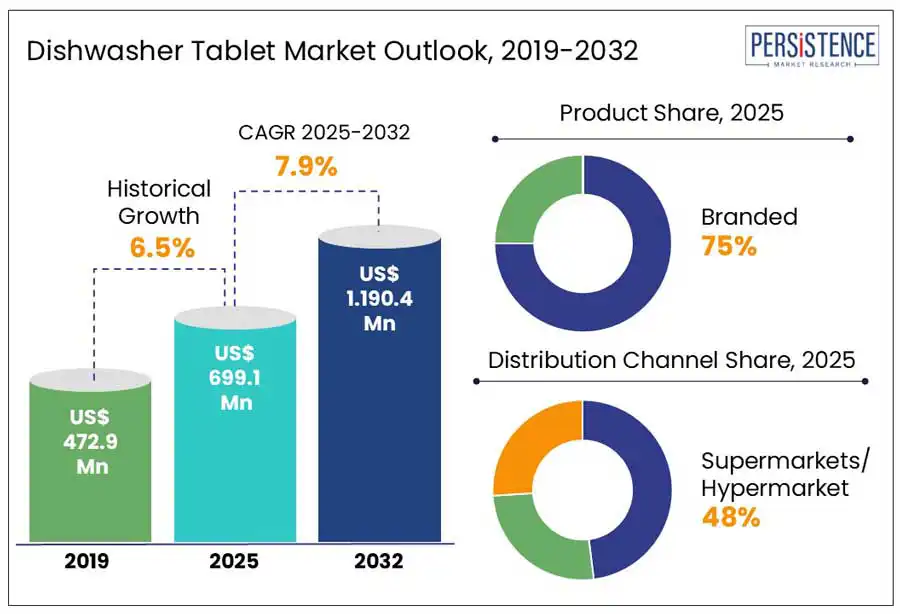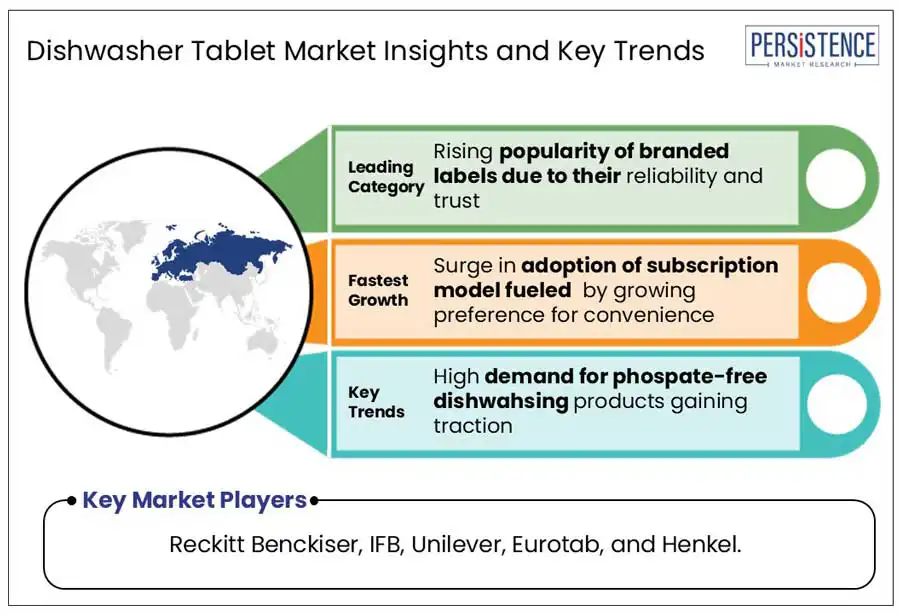ID: PMRREP35272| 190 Pages | 5 May 2025 | Format: PDF, Excel, PPT* | Consumer Goods

The global dishwasher tablet market size is projected to grow significantly to US$ 699.1 Mn in 2025. The market is further anticipated to rise to US$ 1190.4 Mn, registering a CAGR of 7.9% by 2032. The growth is largely fueled by the rising demand for eco-friendly, efficient, and multifunctional tablets that offer convenience, reduce detergent consumption, and minimize environmental impact. The market is also shaped by the increasing popularity of products optimized for smart dishwashers, and those made with biodegradable ingredients and recyclable packaging.
According to the Persistence Market Research report, leading companies such as Procter & Gamble, Reckitt Benckiser, Unilever, and Henkel are securing their positions through a strong focus on product diversification. Their emphasis on eco-friendly formulations and all-in-one solutions aligns perfectly with the demand for more convenient and sustainable dishwashing options. With leveraging e-commerce platforms for direct-to-consumer sales, these industry giants are staying ahead of emerging competitors positioning themselves for continued success in a rapidly growing market. As such, the market growth is not only promising but presents significant revenue opportunities in the forthcoming years.

Key Industry Highlights
|
Global Market Attribute: |
Key Insights: |
|
Dishwasher Tablet Market Size (2025E) |
US$ 699.1 Mn |
|
Market Value Forecast (2032F) |
US$ 1190.4 Mn |
|
Projected Growth (CAGR 2025 to 2032) |
7.9% |
|
Historical Market Growth (CAGR 2019 to 2024) |
6.5% |
As consumers continue to prioritize convenience, the demand for all-in-one dishwasher tablets is rapidly growing. These tablets offer a highly attractive solution for time-pressed households by combining detergent, rinse aid, and water softener into a single, easy-to-use product. In today’s fast-paced world, consumers seek products that simplify their daily routines without compromising cleaning performance. The all-in-one tablets meets this need perfectly by eliminating the hassle of selecting multiple products, while still delivering superior cleaning results. This appeals to busy professionals, working parents, and smaller households who prioritize efficiency in their daily chores.
For example, in January 2023, Cascade introduced its 4-in-1 dishwasher tablet. This innovative product combines four key cleaning functions such as detergent, rinse aid, water softener, and grease-fighting agents, into a single tablet. Cascade's development process involved testing 10 prototype formulations and 13,000 test pods to perfect the formula. The resulting product features enhanced cleaning power, including 50% more protein-fighting enzymes and twice the amount of a new proprietary enzyme to combat stubborn starches.
High cost compared to traditional dishwashing alternatives, such as liquid detergents and bars, is expected to be a significant growth barrier in the market. For many consumers, especially those in price-sensitive regions, dishwasher tablets appear as an unnecessary luxury when handwashing is still perceived as cheaper and sufficient for everyday use. This price disparity is especially apparent in markets where consumers are accustomed to paying only a fraction of the cost for manual dishwashing products.
With dishwasher usage becoming part of daily routines, especially in urban households, consumers prefer the convenience of having essential products such as dishwasher tablets delivered automatically. Dishwasher brands can capitalize on this to move beyond transactional sales toward building direct customer relationships through subscription plans that align with actual consumption cycles. Further, this presents an opportunity for companies to lower customer acquisition costs over time and create brand loyalty compared to fighting for shelf space in saturated retail environments.
To add to this trend, the real opportunity lies in customizing subscription experiences. For instance, offering flexible delivery frequencies based on family size or dishwasher usage habits, bundling with other kitchen care products, or providing incentives such as exclusive eco-friendly tablet variants for subscribers. Moreover, early movers who integrate smart reordering tech, such as QR code-based reorders or IoT (Internet of Things) dishwasher syncing, can consolidate their control over the replenishment cycle.
A classic example is Finish, a popular dishwasher detergent brand owned by Reckitt Benckiser, partnering with Amazon’s Subscribe & Save program in the U.S. The partnership involved consumers receiving automated shipments of dishwasher tablets, sometimes paired with discounts or bonus packs, ensuring consistent brand engagement without repeated purchase decisions. This model is helping Finish tap into recurring revenues instead of relying on one-time retail purchases.
The market is divided into private-label and branded based on product. Among these, the branded segment is projected to hold an astonishing revenue share of about 75% in 2025. The dominance is attributable to growing consumer preference for established, trusted brands that are associated with higher quality, reliability, and effective cleaning performance.
On the other hand, the private-label segment is likely to emerge as the fastest-growing category in the forthcoming years. This growth is fueled by rising demand for cost-effective alternatives, particularly among price-sensitive shoppers and in emerging markets. Supermarkets and retailers are increasingly launching their dishwasher tablets, offering competitive pricing and cleaning efficiency comparable to branded products, which appeals to a broader base of budget-conscious consumers.
Based on distribution channel, the supermarkets/hypermarkets segment is projected to hold a share of about 48% in 2025 and further dominate. This is due to supermarkets offering a wide range of products, including branded and private-label options. This allows consumers to conveniently compare and choose dishwasher products such as tablets, gels, and detergents in one place. Besides, high foot traffic, regular grocery shopping routines, and promotional activities make them the primary choice for most households purchasing dishwasher tablets.
Online segment, on the other hand, is anticipated to experience considerable growth between 2025 and 2032. Rising e-commerce sector is helping consumers with unmatched convenience, scompetitive pricing, and easy access to a broad range of brands and formulations. Various shoppers, especially young and tech-savvy consumers, prefer buying online to avoid store visits and to take advantage of subscription services, bulk discounts, and doorstep delivery. These facilities are thereby driving the segment growth during the forecast period.

Europe is projected to hold the largest revenue share of about 32% in 2025 and dominate the market. Factors such as widespread dishwasher product adoption in households, high disposable incomes, strong consumer awareness about hygiene, and stringent environmental regulations promoting eco-friendly and phosphate-free products are propelling market growth in this region.
Germany dishwasher tablet market is forecasted to experience considerable growth during the forecast period. There is a strong emphasis on hygiene, particularly in kitchen environments, boosting the demand for effective cleaning solutions such as dishwasher tablets in the country. Moreover, there is a visible trend of smaller pack sizes gaining popularity for compact urban households. For example, In Germany, dm-drogerie markt, one of the largest drugstore chains, and Rossmann have adjusted their dishwasher tablet offerings to include smaller, compact pack sizes, especially under their private labels such as Denkmit and Domol.
Asia Pacific is expected to witness fastest growth during the forecast period. Asian cuisines often involve heavier oils, starches, and strong flavors such as those from wok-frying, curries, and seafood. Therefore, companies here are focusing on research and development activities to introduce enzyme-based formulations that are stronger on grease and odor removal. In addition, tablets are being customized to cope with shorter dishwasher cycles, as many homes in urban Asia use compact, countertop models with limited washing power.
Another trend witnessed in Asia Pacific is the growing focus on climate-responsive packaging and formulation. For example, in humid countries such as Indonesia, Thailand, and parts of China’s southern regions, traditional dishwasher tablets degrade quickly due to moisture. As a result, brands are developing moisture-proof wrapping films and offering smaller, monthly-use pack sizes to preserve product integrity.
China dishwasher tablet market is experiencing considerable growth, fueled by companies leveraging big data from e-commerce platforms such as JD.com and Tmall to refine their products based on direct consumer feedback. Brands such as Liby and Blue Moon have launched localized dishwasher tablets engineered to tackle the thick, oily residues common in Chinese home cooking. Overall, the market is poised for significant growth in the country during the foreseeable future.
North America is anticipated to register substantial growth in the market from 2025 to 2032. Consumers here are not just preferring dishwasher products to clean but also for sanitization, deodorization, and protection of dishwasher interiors. As a result, new enzyme formulations are being developed without major changes to tablet sizes.
U.S. dishwasher tablet market has witnessed positive growth backed by growing demand for natural ingredient labels and dishwasher detergents. Established retailers such as Walmart and Costco offers bulk-buy deals on dishwashing detergents, gels, tablets, and other cleaning products, which is further driving the product demand. Moreover, growing preference for zero waste dishwasher tablets sold in compostable packaging in coastal cities such as San Francisco and New York is expected to propel market growth during the forecast period.
The global dishwasher tablet market is experiencing dynamic growth, fueled by strategic partnerships, facility expansions, and a focus on innovation. Manufacturers are collaborating with dishwasher appliance companies to introduce innovative products, solidifying their market penetration and consumer convenience. Investments in research and development activities have led to the introduction of eco-friendly formulations, such as phosphate-free and biodegradable tablets, aligning with the increasing consumer demand for sustainable household products.
The shift towards online retail channels has also been significant, with brands leveraging e-commerce platforms to reach a broader customer base. Overall, the market is witnessing intense competition on the lines of innovation, strategic alliances, and geographic expansion, positioning it for positive growth in the forthcoming years.
The global market is projected to value at US$ 699.1 Mn in 2025.
The market is driven by increasing demand for convenience, with all-in-one tablets combining multiple cleaning functions in one product.
The market is poised to witness a CAGR of 7.9% from 2025 to 2032.
The key market opportunities include the rise of subscription models, allowing brands to establish direct consumer relationships and recurring revenue streams.
Major players in the dishwasher tablet industry include, Reckitt Benckiser, IFB, Unilever, Eurotab, and Henkel.
|
Report Attributes |
Details |
|
Historical Data/Actuals |
2019 - 2024 |
|
Forecast Period |
2025 - 2032 |
|
Market Analysis |
Value: US$ Mn |
|
Geographical Coverage |
|
|
Segmental Coverage |
|
|
Competitive Analysis |
|
|
Report Highlights |
|
|
Customization and Pricing |
Available upon request |
By Product
By Distribution Channel
By End-user
By Region
Delivery Timelines
For more information on this report and its delivery timelines please get in touch with our sales team.
About Author